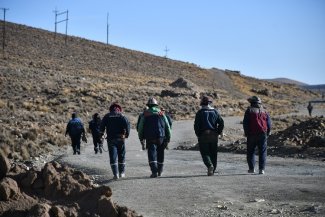It is becoming increasingly apparent that important aspects of the World Bank’s work over the next decade will involve information technology, and that this has significant implications for the right to privacy.
So far, the Bank has downplayed concerns about privacy in its projects and policy advice.
But the Bank must clarify its approach to the right to privacy and strongly demonstrate that it is committed to safeguarding personal data from misuse. This is essential to instill public confidence that the Bank is committed to giving thoughtful advice to governments about safeguarding privacy and personal information in the projects it supports.
The Bank is under substantial pressure from donors to demonstrate that it can deliver development and poverty reducing results. This has led the Bank to focus on the “science of delivery,” or methodologies to improve the quality of public services.
This work frequently involves providing governments with expertise and support for technology to register and collect data from members of the public. Moreover, the Bank strongly advocates an approach to development that emphasises means testing, or other targeting of social benefits based on need. This has also contributed to the increased interest in technologies to register participants, collect data and manage benefits and services received.
Some recent examples of countries where registration and targeting have been used include Yemen, Pakistan and Egypt. These are countries in which the International Monetary Fund and Bank have required governments to remove fuel and other subsidies.
The Bank has stated that at the same time measures such as school feeding programs, job creation schemes, and cash transfers programs are to serve as mitigating measures to cushion the impact on the poor and on workers as subsidies are removed.
However, it is clear that these and many other developing country governments lack the administrative capacity to register beneficiaries and employ such targeting with sufficient speed so that benefits do in fact effectively serve as mitigating measures.
At an event held in April, World Bank chief economist President Jim Yong Kim and chief economist Kaushik Basu championed the work of Nandan Nilekani, the chair of India’s Unique Indentification Authority of India, or Aadhaar.
The technological prowess behind the Aadhaar, a government agency to register and identify residents, is impressive. It has already registered and assigned 12 digit identification numbers to over 300 million people In India and intends to enroll all of the country’s 1.2 billion residents.
Kim observed that the Aadhaar’s technological, “implications are just stunning,” for health, education and social protection, and that it could be made available in Africa and in other countries.
But what was worrisome during the event was Nilekani’s dismissal of concerns raised by audience members who asked questions about privacy, even downplaying concerns by a World Bank staff member who cited an example of an Indian citizen who had expressed distrust to her about participating in the Aadhaar system.
Kim and other senior Bank officials’ were silent on privacy issues or the need for regulation to avoid potential misuse of the data during the event.
Yet not long afterwards, a Reuters news report stated that India has set up an elaborate system to tap into residents e-mails and phone calls without oversight by courts or the parliament.
An earlier, eye opening New York Times piece by an Indian journalist details concerns about the Aadhaar that led a parliamentary committee to review it, effectively halting it for a time.
This lends substance to the qualms the Indian citizen expressed to the World Bank staffer about misuse of data collection associated with the Aadhaar system.
Other aspects of the Bank’s work also raise questions about registering participants and data collection.
Currently under debate at the Bank is a proposal that would support governments, mainly in Africa, that have significant revenues from oil, gas and mining industries to make direct transfers to the public from a portion of the revenues received. Discussion of such schemes, no matter how promising, should not move forward until the Bank clarifies how it would address concerns regarding registering residents and data collection.
This includes in countries such as Angola and Equatorial Guinea, both which are considered highly repressive, and which restrict independent unions, opposition political parties or other civil society organizations from operating freely, all factors that indicate a strong potential for misuse of data.
World Bank staff are increasingly championing other aspects of the use of information technology to improve public service delivery.
This recent blog posting by a World Bank staffer expresses concern that there are some who advocate that teacher absenteeism be dealt with by taking pictures of teachers as they enter and exit buildings, and sending the pictures to education authorities or posting them on line to publicly shame them. This blog posting is welcome, as it makes clear that such uses of technology are undesirable, and suggests that instead technology should be used to support teachers.
And to its credit, the World Bank’s new strategy for support to health systems in the Middle East and North Africa region explicitly states that it will support activities upholding patients’ rights to privacy, anonymity, and confidentiality. We do not know what this will mean in practice, but it is a welcome recognition that right to privacy must be incorporated into Bank activities.
Notwithstanding these two welcome examples that suggest that the Bank recognises the need to address privacy concerns, the institution should be more forthcoming about how it intends to protect privacy in its projects.
None of us could or should have confidence that the Bank can give appropriate advice to governments until it makes clear what its own policies are, and what privacy safeguards and checks and balances it intends to recommend to governments.









